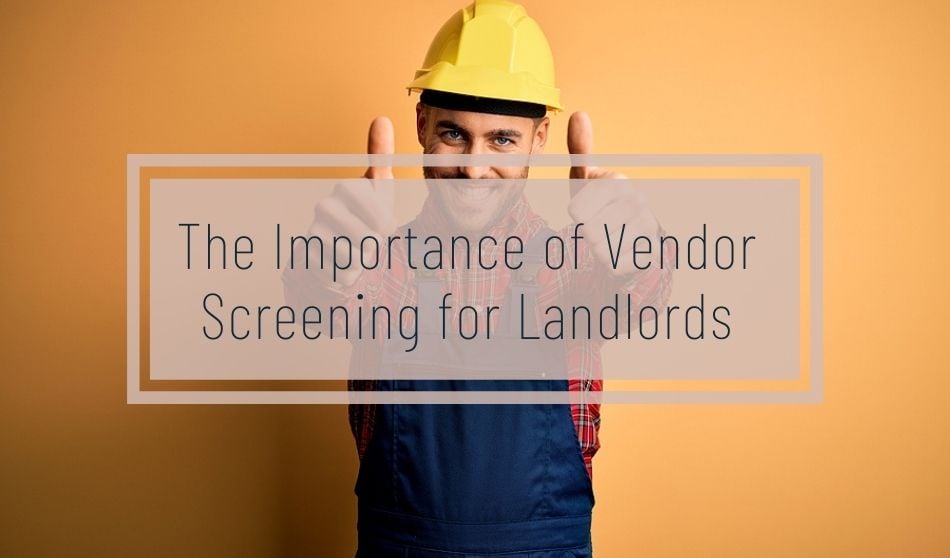Choosing a vendor for your rental property business involves more than finding a service provider skilled in their trade. Every vendor you hire becomes a representative of your business and their service will affect the experience of your tenants and owners. In order to protect your business’s reputation and ensure the safety of your property and tenants, maintenance vendors should be carefully selected before you decide to work with them.
Every landlord and property manager should have a list of approved vendors ready before they are needed. Researching and finding reliable workers is a lot easier when you are not faced with an emergency. Brainstorm all the possible types of services you could potentially need as a rental property manager whether for routine maintenance or a natural disaster.
Property managers and landlords will have vendors for a variety of services from repairs during tenancy and turnover to routine maintenance and business tasks. While every vendor should be assessed and vetted prior to service, maintenance vendors are especially important to screen because of their interactions with tenants and the potential liability to your business.
Vendor screening for property management tasks takes time and research but the effort used to find the right personnel will save you real money by avoiding potential damages or when faced with liability or fair housing claims.
Before selecting a service provider to work with, it is important to understand what your rental properties will need from each vendor. Identifying specific needs will help you make an educated selection when comparing vendor services and realizing they are not the same. You need to be able to judge what a potential vendor can do for you against what you really need them to do in order to find a great match.
Once your needs are established do some research on local vendors for each type of maintenance issue you might encounter as a property manager. If you self-manage, decide which jobs you will handle yourself and which ones you will contract out to a vendor.
Begin Your Vendor Screening:
Begin your vendor screening by examining their accessibility, compliance, experience, licensure, insurance, and other basic requirements.
Accessibility:
How close is the vendor located to your rental properties? Are they easy to contact and return correspondence in a timely manner? Do they offer 24/7 services or emergency solutions?
Licensure:
Make sure both the business license and the individual’s professional license are up-to-date. Unlicensed vendors should be avoided. You want to know the status of the state, county, or city license if required by local statutes.
Insurance:
It is important to know if the vendor has insurance to cover any damages, injuries, or liability claims if necessary.
Experience:
How long has the vendor been in business? Do they have testimonials or referrals that allow you can assess their quality of work and interpersonal skills?
Employees:
Does the vendor screen their employees or the contractors they might send to your property? A property manager or landlord could ultimately be found responsible if they contracted a vendor who employed a dangerous or irresponsible person that caused harm to a tenant, the property, or themselves. It’s always good practice to do your part of due diligence to protect yourself.
Vendors should be happy to provide this information to you in order to secure your business. If a vendor is hesitant or refuses, that should be a red flag not to work with them. You can also conduct your own research to make sure everything is updated and valid. Beyond your own research, property managers and landlords can take advantage of vendor screening services that check criminal and financial backgrounds of vendors and their businesses.
Vendor Compliance with Your Rental Business Policies
As part of your screening process, you should create a set of company policies and rules you expect all vendors to follow when working on your property and/or interacting with tenants. Once you have established a relationship with a vendor, they should have no problem complying with your expectations, policies, and procedures. You should get it in writing in order to demonstrate due diligence on your end for attempting to provide quality service for tenants and owners, should an issue ever arise.
You should have a mutual understanding of the following:
- How you will contact a maintenance vendor for required services.
- A timeline for when services need to be rendered, for assessing the issue, providing an estimate, and completing the work, if approved.
- What sort of documentation your vendor needs to provide, in terms of contact with management or tenants, photographs of required work, estimate paperwork, and invoices.
- What to do if work cannot be performed at the agreed-upon time.
- Your anti-discrimination policy.
Overall, the task of properly screening potential vendors for criminal, financial, and ethical records is very time-consuming however, it cannot be overlooked because of the potential legal, ethical, and financial consequences.
Vendor screening should be included as part of your standard operating procedures and implemented to increase your company’s value, provide an established value-added service to tenants and owners and protect your rental business from liability.
Tenants can rest easy knowing that vendors entering their homes have been screened and are in compliance and are on an approved list. Property managers are particularly susceptible to blame by property owners for faulty vendor workmanship or inappropriate vendor behavior. Although vendor compliance does not assure a vendor’s quality of work or his ethics.
How to Find Qualified Vendors
Besides online research for local vendors, a great way to find qualified vendors is to work with a professional network for referrals. Your local landlord association should have a list of preferred vendors posted online or an association event will connect you with other property owners who will be able to give word of mouth recommendations for vendors that specialize in your industry.
This article was first published in June 2018 and has since been updated.
Related Reading For You:
